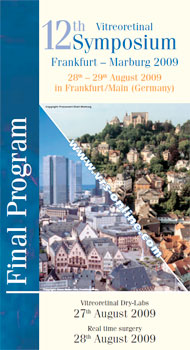12th Vitreoretinal Symposium Frankfurt – Marburg 2009
Scientific programm: Abstract
3rd scientific session: Age Related Macular Degeneration
22. The Use of Anti-VEGF Inhibitors in wet AMD:
Balancing the Risks
 Klaus Pels (Berlin)
Klaus Pels (Berlin)
Vascular Endothelial Growth Factor (VEGF) is an angiogenic key molecule playing an important role in various physiologic and pathologic processes. VEGF-A and especially the isoform VEGF165 are involved in the pathogenesis of the choroidal neovascularisation in age-related macular degeneration (AMD). Two VEGF-inhibitors have been developed and are presently approved for the treatment of wet AMD: 1) Pegabtanib (Macugen®, OSI Eyetech / Pfizer), an aptamer, which selectively inhibits VEGF165. 2) Ranibizumab (Lucentis®, Genentech / Novartis), a monoclonal antibody which inhibits all isoforms of VEGF- A.
Bevacizumab (Avastin®, Genentech / Roche) is also a monoclonal antibody that blocks all isoforms of VEGF-A and was developed for the therapy of metastatic carcinoma. Even though not approved for ocular use it is being used off-label for the treatment of wet AMD.
VEGF is not only an angiogenic growth factor it is also a vasculoprotective molecule which has anti-inflammatory and anti-thrombotic effects. Due to these properties VEGF has become of interest for the treatment of cardiovascular diseases.
The ocular therapy with anti-VEGF inhibitors results in systemically effective levels. Numerous epidemiologic studies have shown an increased risk of cardiovascular diseases and thromboembolic events like myocardial infarction and stroke in patients with AMD. In previous clinical studies with pan-VEGF inhibitors it has been reported that repeated intravitreal injections lead to an increased incidence of thromboembolic events (in particular strokes) whereas the selective VEGF-inhibition does not cause any thromboembolic complications. The number of patients in these studies is too small and the follow-up time is too short for a definitive conclusion. But these warning signals should be considered in particular for cardiovascular high-risk patients: The appropriate anti-VEGF treatment should be carefully selected for individual AMD-patients to balance the benefits and the risks of this therapy.
Copyright © VRS-online, 1999-.
All rights reserved. Impressum, rechtliche Hinweise
HTML & Webdesign: SPALLEK.COM
